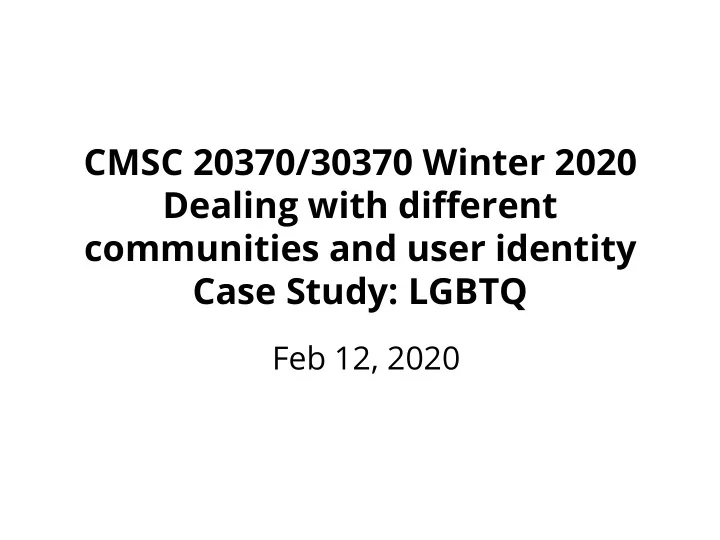

CMSC 20370/30370 Winter 2020 Dealing with di ff erent communities and user identity Case Study: LGBTQ Feb 12, 2020
Quiz Time (5-7 minutes). Quiz on “Too Gay For Facebook” Principles of Good Design
Administrivia • GP2 poster in class session and report due on Monday – You’re welcome to invite anyone to attend to see the posters if you want – The TAs and I will circulate to give each group feedback – Groups will get a chance to see others’ posters and provide feedback – We will have tape and set up along the walls
Today’s Agenda • Dealing with users in di ff erent communities • Thinking about user identity • Case Study: Lesbian, Gay, Bi-sexual, Transgender, Queer (LGBTQ) on Facebook
Case Study: Too Gay For Facebook • Looked at how Lesbian, Gay, Bisexual, Transgender, Queer users manage identify on social media • Used cognitive mapping and qualitative interviews • Example of how users take care to present themselves as they desire to be perceived and impression management
Presentation of Self In Everyday Life – Erving Goffman 1956
Summary of Presentation of Self • Face-to-face interaction as theatrical performance • Interacting with others face to face you try to guide/ control impression others make of you – Do by altering your appearance, setting, manner – Affects how others perceive you • Everyone tries to avoid being embarrassed or embarrassing others • Like theatre (dramaturgical approach): – Front region on stage where performers are in front of the audience • Highlight positive idea of self and desired impressions • Includes manner and appearance that role is carried out • Can work with others as a team for a performance – Back region where individuals can prepare for their role or set aside their role
Norms, Audiences, Platforms • Different communities have different norms • You have a notion of different audiences • Different platforms may have different affordances – E.g. privacy settings – E.g. How you can express your identity
Context Collapse You at UChicago with your friends • What if all of these people follow You at UChicago with your professors you on Twi?er? • How do you do impression management? • Which version of “you” do you You with co-workers at an off campus job want to showcase? You at home
Imagined Audience
Personal social media ecosystem
Thought activity: Think about a fi rst date 1. What would you not tell your date about yourself or what would you not bring up in conversation? 2. What would you emphasize about yourself in your conversations? 3. How might you behave on a fi rst date that is di ff erent to how you behave normally? 4. How would you dress yourself physically?
Case Study Findings: Using di ff erent platforms for facets of identity 1. Low identity persistence seen as enabling more freedom of expression of true self
Case Study Findings: Curation of content for target audience 1. Careful curation of content for imagined audience – e.g. P11 blocks two of her sons – Careful about liking certain content – Engage with “queer” content from di ff erent platforms to separate out spaces
Case Study Findings: changing identity over time
Case Study Findings: Managing the whole ecosystem is complex and one a ff ects others
Implications for design 1. Try not to lock people or content into a particular platform 2. Rethink what “privacy controls” mean to people 3. Allow people to easily limit what past content is associated with them
What about…. • Data collection…
• Personalization
• Automatic gender recognition systems e.g. facial recognition
• Name changes, voice changes, supporting changes to identity
h?ps://www.morgan-klaus.com/sigchi-gender-guidelines
Is this limited to LGBTQ? • No, identity is a fundamental part of being human • Accommodating and supporting di ff erent identities is useful but have to balance trust, privacy, security
Summary • People play di ff erent roles in life for di ff erent audiences • Inclusive systems have to support these various roles and identities • We have to be inclusive in terms of gender in data collection, design, and evaluation phases • Biases codi fi ed so we have to take a step back to re fl ect on assumptions
Coming up… • GP2 poster session • GP2 due date is moved • Talking about stereotypes…
Get in touch: O ffi ce hours: Fridays 2-4pm (Sign up in advance) or by appointment JCL 355 Email: marshini@uchicago.edu
Recommend
More recommend